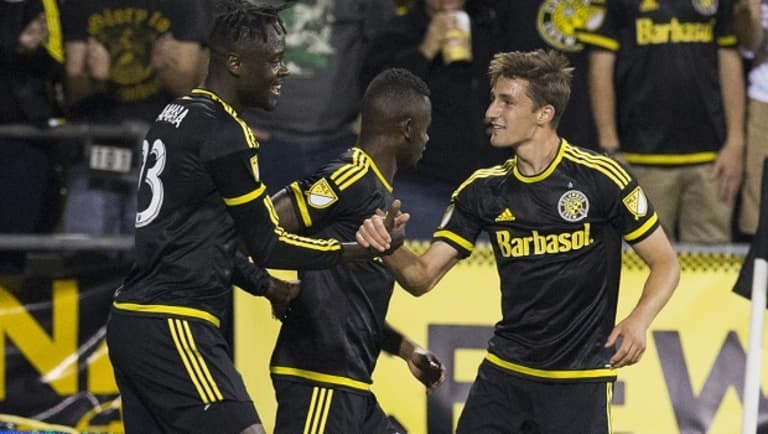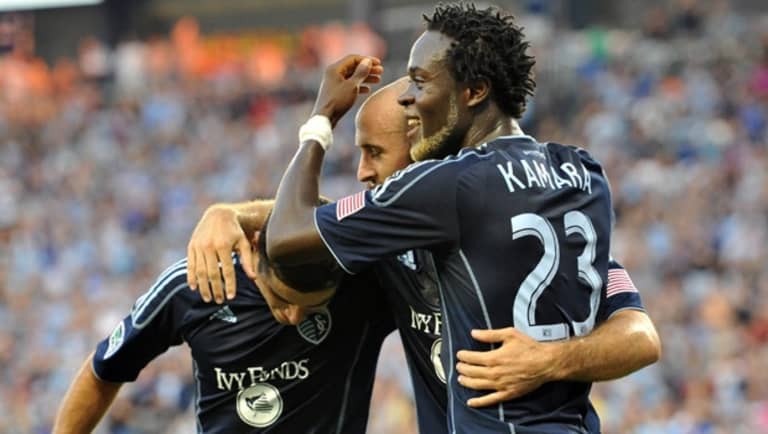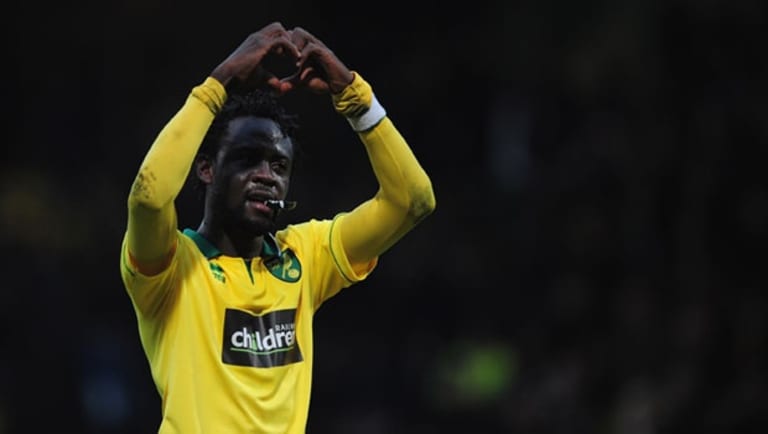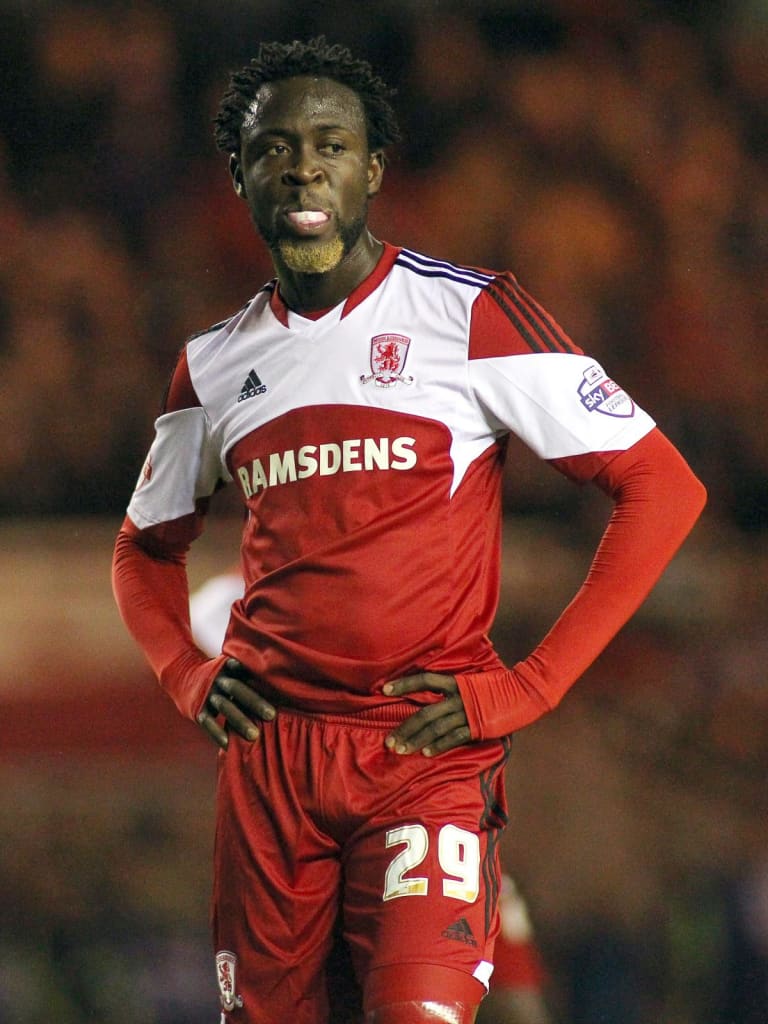COLUMBUS, Ohio – All Kei Kamara wants is a little respect.
In what has become a prominent storyline throughout his MLS career, voters snubbed the Columbus Crew SC forward and league-leading goalscorer in the AT&T MLS All-Star Fan XI. Instead, fans opted for the big names such as David Villa, Clint Dempsey and Obafemi Martins, leaving Kamara out in the cold – again.
In interviews and social media posts, the Sierra Leone international made his disappointment known. It was clear, he said, that selection was dependent on whether you were “a US national team player…or a Designated Player.”
It wasn’t the first such snub of Kamara’s career, which only added to his frustration. After scoring a friendly goal against Manchester United in 2010 while a member of the Kansas City Wizards, Kamara revealed a shirt that read “KCW All-Star” to protest another perceived slight.

Five year later, craving that same respect, Kamara still doesn’t believe others see him the way he sees himself.
“Since I’ve been in this league, I’ve always put in work on and off the field, that’s really kind of me,” he explains in an exclusive interview with MLSsoccer.com. “It’s not just what I do on the field, I do a lot of things off the field. I represent the league well and my teams well. So it’s just about me getting respect for the things I do.”
Unlike 2010, Kamara’s frustration didn’t last through the 2015 AT&T MLS All-Star Game. One call from All-Stars head coach Pablo Mastroeni changed that.
Finally, after years of snubs, perceived or otherwise, he’s an All-Star, acknowledged as one of the league’s brightest talents. In his ninth MLS season, the 30-year-old striker has already eclipsed his best MLS goal total with 15 and sits just three assists away from another career mark.
More importantly, perhaps, he’s found a home in Columbus, a place where he can thrive professionally and personally, balancing goal-scoring with raising a newborn daughter that’s changed his perspective on life.
----
During his first eight MLS seasons, Kamara was no slouch.
The Cal State Dominguez Hills product, who moved from Sierra Leone to Southern California at the age of 16, racked up 52 goals and 23 assists in nearly 200 matches, but never spent more than two years in one place (Columbus, San Jose and Houston) before Kansas City took a flier on his mercurial talents in 2009.
It was there, after a trade from the Dynamo, that Kamara finally found a home.
He averaged 10 goals a season between 2010 and 2012 as the Wizards became Sporting Kansas City, a driving force in the revolution that transformed the club from also-ran into juggernaut. He doubled as, arguably, the league’s most difficult defensive matchup and the most marketable star on one of the league’s most popular and visible teams.

But as he gained notoriety, Kamara faced a choice.
When his agent said a move to England might be in play, the striker jumped at the opportunity.
“I watched English football growing up in Africa,” Kamara says. “Even here, you wake up on Saturdays and that’s what you watch. And I knew a few people playing there. I was always like, ‘I’d really like to play in England,’ but I never knew what the steps were.”
He went on trial with English Premier League club Stoke City, giving him the exposure and belief he needed to break through across the Atlantic.
“It opened my eyes,” he says, “that this could be something that could be possible for me.”
At the time, Sierra Leone sat high enough in FIFA’s world rankings to qualify Kamara for a work visa, and by January of 2013, he had secured a loan with Norwich City in the Premier League.
“He’s always had big plans about what he wanted to do,” Vermes told MLSsoccer.com when contacted for this story. “He’s had goals. He goes out and sets his sights on those and goes out to achieve them.”
Kamara made seven appearances for the Canaries, scoring his only goal in his second appearance and notching multiple assists during the short stint. But positive reviews of his performances and, once again, a growing status as a fan favorite weren’t enough. Norwich chose not to extend his deal.
“I wasn’t surprised,” Kamara says. “They were a team that was struggling. They needed a striker to score some goals for them.

“So for a striker that they wanted – I only scored one – they wanted more. They weren’t safe in the relegation battle and my loan only extended until there were two games left in the season. They had to make all these decisions and the amount of money they had to pay for my transfer.”
It wouldn’t be the last time “a lot of business” got in the way of a good situation. He returned to Kansas City, a town he had come to call home, in the middle of the 2013 season. The club and city welcomed him back with open arms.
Kamara quickly picked up where he left off, scoring seven goals in just 15 games between June and August. But with his European intentions known, he admitted it was an awkward situation.
“I felt like nobody really trusted me to stay, even though I didn’t know if I was leaving or not,” Kamara says. “So I just stayed and wanted to be a part of it and be a part of the team. At the end of the day, I wasn’t there long. But it was great to go and come back.”
By the end of the summer, Kamara secured a move back across the pond.
Sporting transferred him to Championship side Middlesbrough, where he made 25 appearances and scored four goals before injury and a new manager with a “different point of view” relegated Kamara to the bench.
On Dec. 7 of that year, Kamara injured a medial collateral ligament in a match against Birmingham, and made only three league starts the rest of the season. To add insult to injury, he watched the team he’d played for just three months earlier lift MLS Cup the very same night he injured his knee, a “bittersweet” moment.
“We were six hours ahead, so I had my game, injured my MCL, got home and [I had] that feeling, I just knew they were going to win that championship,” Kamara remembers. “It was destined to be.”
It was a difficult night for Kamara, but most of all he was proud of the team “where I played [five] years in my career and helped build a soccer town to where it is today.” He still hasn’t received his championship ring, he jokes.
By the next summer, Kamara was on his way out of Middlesbrough.
“I really enjoyed my experience [in Norwich] and that was the reason for me to go back to England,” he says. “I’m not saying Middlesborough wasn’t great, but it wasn’t what I expected. I enjoyed my time there, and obviously it was Championship football.
“A lot of people say, ‘Oh, maybe you couldn’t handle Championship football.’ I scored goals when I was there.”

With offers from multiple clubs abroad, Kamara was at a crossroads. He could either continue to struggle through the inconsistencies of European soccer, or return to a rapidly growing league he knew well.
“When I became free, I said, ‘Why not go back to where I started in America at the prime of my career and really make a statement for myself?’” Kamara says. “I didn’t want to waste the prime of my career.
“I’m 30; I can’t stay at a place where I’m not going to play or I didn’t know how many games I’m going to play. I could have bounced around to different clubs that wanted me, but it’s not all about the stability or saying, ‘I’m going to go to MLS because everyone knows I’m Kei Kamara there.’
The vision of his former team lifting a trophy without him also weighed on his mind. He wanted to win something. He wanted to be the man while his legs still had the rigors of a full season in them.
But a return to MLS wasn’t a simple proposition.
Because Kansas City received a transfer fee for his departure, they no longer owned his rights. Instead, Columbus sat on the top of the league’s allocation order. Crew SC – mid-overhaul under the direction of Gregg Berhalter – had first dibs.
Once again, the “business” stood in the way.
His agent opened discussions with Crew SC, the forward’s first professional club. Kamara, however, “really wanted to be back in Kansas City.” But Kansas City didn’t necessarily need him, and Columbus quickly showed Kamara that they considered his rights more than trade bait.
Early in the process, his agent surprised him by relaying that Berhalter wanted to talk.
“I said, ‘Yeah, sure. Give him my number,’” Kamara says. “When [Gregg] called, the first few words he said were, ‘It’s OK if you want me to trade your rights to a club. Just tell me where you want to go and we can make that trade happen. I don’t want you here if you don’t want to come here.’
“When I heard that, for me, it melted my heart. It said, ‘This is somebody who does actually care.’ It was the point of the whole conversation for me.”
Said Berhalter: “I wanted him to understand our plans and how important he was to what we were doing. But for me, it was also about hearing about him and what he wants. It was coming from a place where I didn’t want anything in return. I just wanted to talk to him.”
Kamara says he didn’t even need to hear the rest of the conversation. He was sold.
“After we spoke, I’m thinking about that and thinking about that,” he remembers. “I thought, ‘If he’s going to offer that to me, he really does care about something.’ I talked to my wife about it and we agreed: ‘Let’s do Columbus.’”
---
A year later, Kamara seems to have chosen well.
He and his wife Kristin quickly settled into life in Columbus with their dog Chelsea, named for Kamara’s favorite team, and added a new member of the family in June, daughter Kierin Leon.
Kamara is a new dad, the league’s leading goalscorer and a member of an AT&T MLS All-Star roster for the first time. But that doesn’t mean he still doesn’t harbor some disillusionment about the way he feels he was overlooked during his first stint in MLS.
He admits he knew he’d be at the All-Star game “no matter what,” but said “it hurt” to miss out on the Fan XI again based on the numbers he’d amassed. He knows there will always be “bigger players” who outshine him in the public eye, but Kamara is confident that he has what it takes to be a face of the league.
“Some people don’t really know you,” he says. “Some people just know your goals and stuff like that. For me, my work that’s going in on and off the field is really what I am. It’s not just training and locker rooms. People don’t really know how I live my life. So now, if it’s about showing it on the field for them to respect that, that’s what I’m going to keep doing and that’s what I’ve been doing.”
Becoming a dad has helped Kamara find some perspective as well.
“When you’re done, what are people going to say about you? What do they remember you by? Those are the things that you’re pushing for,” he says.
Plenty, if his past and future are any indication. In the midst of the best season of his career, Kamara can take a moment to recognize what he’s achieved – and what is still yet to come.
“It’s a blessing, that’s all I can say,” he says. “It’s really a blessing to transition and move to different countries, different states, different teams and still be loved. I can leave today and go out and watch a game in Norwich and people will say hi and want to take a picture with you. And they do the same thing in Middlesborough or Kansas City.
“So it’s a blessing for us to be here in Columbus and have a baby and be raising a child and have Chelsea. It’s amazing. I wouldn’t want to change anything in the past few years that’s happened to us.”






